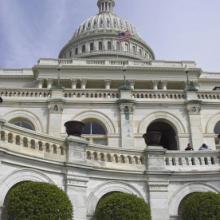federal workers
As the federal government shutdown enters a painful second month, the human consequences and costs continue to grow. President Trump’s sham “compromise” over the weekend failed to break the impasse as Democrats continue to hold firm to the principled demand that negotiations over border security take place only after the government is reopened. Today, the Senate is set to vote on this “compromise” as well as a bill that would simply reopen the government for a few weeks to allow serious negotiations without the operations of the government held hostage. The second bill is the one we should urge senators to vote for, though the president and Republican Leader Mitch McConnell are urging Republican senators to vote against it as Trump feels its passage would weaken his negotiating position.
WASHINGTON — “All labor has dignity.” That’s what the Rev. Martin Luther King Jr. said 50 years ago, and it’s still as true today.
Yet too many working men and women are unable to live with dignity in a world where the fastest-growing jobs are the lowest-paying ones. Just and living wages are a moral imperative, and workers must earn enough to afford the basics for themselves and their families. That’s why we have come together to support those fighting for a living wage.
As it turns out, the largest low-wage job creator in the country isn’t Wal-Mart or McDonald’s — it’s Uncle Sam. Through federal contracts, loans, and leases, the federal government employs about 2 million low-wage workersacross the country — sewing military uniforms, cleaning the bathrooms at Washington’s Union Station, serving Big Macs at the Smithsonian’s National Air and Space Museum, and hauling federal loads on trucks. Too many of these workers can’t even afford rent and food, they work without any benefits, and often are forced to rely on economic safety net programs like food stamps, Medicaid, and Section 8 housing vouchers to meet their basic needs.
Making matters worse, many of these workers are not compensated for overtime work and are actually paidbelow minimum wage. It’s illegal, but it happens. As faith leaders, we have visited with many of these workers and have asked President Obama to meet with them too.

